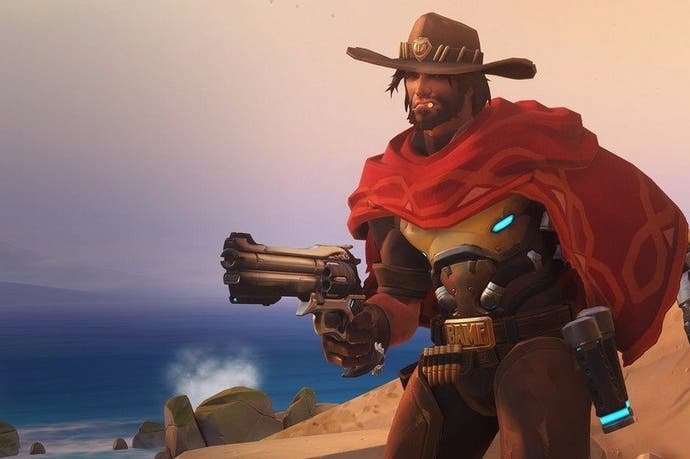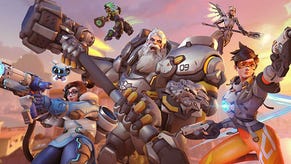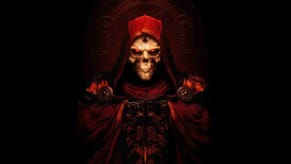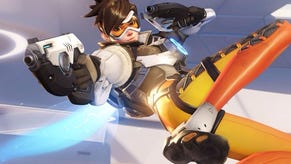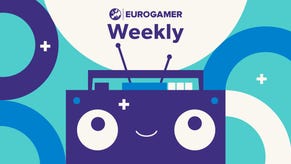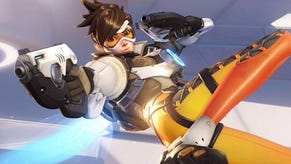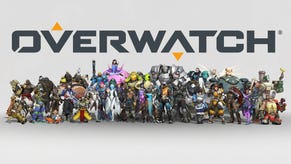Blizzard: why we won't sell Overwatch heroes
"I totally get why players had apprehension."
It must have been a strange Blizzcon for the Overwatch team this year. On one hand, they'd just launched their closed beta and people seemed to be having a brilliant time with it. They had some big reveals planned for the show itself, in the form of three new heroes and the news that the game would indeed be coming to consoles. But that, really, wasn't what the community wanted to talk about.
Instead, the discussion was focused on the confusion surrounding whether or not Blizzard would ever sell new heroes and maps for the game, after launch. We asked them about it ourselves at the show and received a very vague response in return - the Overwatch community didn't like the sound of that.
This week we've seen the game director for Overwatch, Jeff Kaplan, address this concern directly in a developer update. He confirmed that all future heroes and maps will be introduced as free updates and not as paid DLC, which is brilliant news. But why the confusion at their own show? And how do they feel about selling things like character skins and cosmetic options later down the line?
I spoke to Kaplan about all of that and quite a bit more. Join us below as we talk monetisation headaches, player rankings and the game's upcoming progression system.
The closed beta has just gone offline, albeit temporarily. What's the team up to during that downtime exactly? What are you working on?

Jeff Kaplan: We've been gathering intense amounts of feedback throughout the beta and we've really been following the community closely. In my mind, the beta already feels very old. When I look at it I'm like "oh god, we've already fixed x, y and z". I'm very excited to bring the beta back up sometime early next year and have players see and experience all the changes based either on their feedback, or just through them playing the game, as we collect the data from it.
Can you give me any hints as to what some of those changes may look like? I know you mentioned a couple of points you want to tackle in the last developer update, but is there anything else on the list right now?
Jeff Kaplan: Yeah, absolutely. I'll give you two examples. One is big and will be really impactful, and the other is a small, tactical change.
One of the things that we've seen a lot of requests for from the playerbase is some sort of progression system. They love the moment-to-moment gameplay, but they want to see something for their time investment in the game. Ironically, Overwatch has actually had two progression systems in it previous to the beta and we removed them both for various reasons. But when we come back up with the beta, or shortly after, we will have a new progression system in place for players. This is a really big feature that a lot of people have been talking about.
On the smaller, tactical side, one thing that was annoying some players was when you reloaded with some of the guns for some of the heroes, the animation didn't line up exactly with the timing of the reload. You could also interrupt your reload with a quick melee or an ability and you'd be forced to go through the reload all over again. We've fixed that. There's a handful of big new features and there's also a lot of quality of life things like this reload adjustment.
Can you walk me through how the progression system might work, or the kind of ideas you're talking about at the moment?
Jeff Kaplan: Our plan during this break, since we have about a month and a half to two months, is to try some things internally. So I don't have the exact design which I can lay out for you, but I can share with you some of the values.
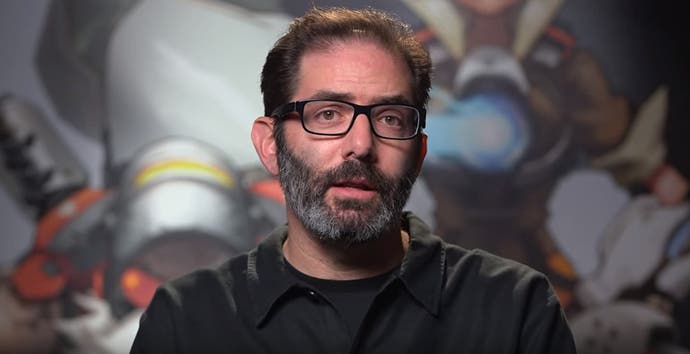
Unlike World of Warcraft or Diablo, where the progression is one of the main motivating factors in those games, whether it be what your level is or your gear, Overwatch is different in that sense. We don't want the progression system to be burdensome in the fact that it's telling you what to do or how to play. It probably won't be the thing that makes you decide what hero to play - in fact, we would look at that as a mistake. We also won't reward you, in any way, with player power or anything like that. You're not going to get better guns, or have more hit points, or become more powerful. We're going to focus the progression system on cosmetic rewards and we think that will be a lot of fun for people. Ever since we announced the Origins Edition, people have responded really well to the skins. So we're going to look for a way to introduce more customisation through our progression system.
And so is that something that largely rewards time investment, or is there going to be a way for skilled players to show off with things only they can unlock?
Jeff Kaplan: Hopefully a little bit of both. Like I said, we don't have the system completely designed out yet. I think for the most part, the progression system will be more based on your time investment, than skill necessarily. But I think if we tune it correctly, we can tune it in a way where higher skilled players and players that are performing well can progress faster. I think that would feel pretty good for people.
When are we likely to see the beta return? I think you originally said maybe mid to late January. Is that still holding up?
Jeff Kaplan: Yup, that's our goal. But the truth is, if we got into late January and we were a week away from a really cool feature or some fix that we wanted to get to, I would rather hold the beta and slip into early February. But right now, things are looking awesome and our goal is to hit that mid to late January window.
How's the team feeling about how the beta has gone so far? Are you happy with that first phase?
Jeff Kaplan: I think the beta went far better than anybody really expected. There was very little in terms of downtime. We're very lucky in the fact that we have a lot of very experienced online engineers and support people that have throughout Warcraft, StarCraft and Diablo, gained an experience of what it takes to run a live service. They did a fantastic job and the stress test went exceedingly well. We were doing all sorts of crazy things like ripping servers offline, trying to simulate a crash or a hardware failure, and we almost couldn't get the service to not perform well.
And then, what I personally really enjoyed was a lot of the interaction that was going on between the dev team and the community, in terms of playing the game together, sharing feedback and really figuring out where balance is at. Talking about what's fun and not fun, and what types of features the development team needs to focus on.
The last game that I worked on that was in a beta was Wrath of the Lich King, so that was back in 2007 and spilled a little bit into 2008. One thing that was awesome about the Overwatch beta was being in this age of streamers, YouTubers and content creators. At any moment I could go to Twitch and watch the game being played. All of this is extremely valuable for the development team because it gives us all of this other insight: a direct look at other people's perception of the game. I really enjoyed that.
Perhaps unsurprisingly, I'd like to talk about your big announcement this week - future heroes and maps being introduced as free updates. Are you pleased to see how the community has reacted to the news? It looks very positive from where I'm sitting.
Jeff Kaplan: Yeah, I was super happy that they received the news the right way. It was something that was very challenging for us because at Blizzcon we were so excited to come out and say "Oh my god, here's this game! We made it because we love it and we hope you guys love it, and not only that, but Blizzard are going to be doing a simultaneous release on Xbox One and PlayStation 4." We were really happy with the business model because we feel like it's really good value for people, not only the base edition but the fact that we have this Origins Edition too.
All the heroes were going to be included and as gamers, we thought it was a very straightforward, easy to understand business model. You focus less on the business model and more on the game itself. And we were really not expecting [to be asked] what's going to happen after the game is launched. It takes so much work to ship a game. So there we are at Blizzcon and people were just hammering us and you kind of realise that wow, there's a lot of distrust out in the community, because I think a lot of players have felt like they've been burned in the past. Like, oh god, these games companies are just trying to get so much out of me.
We hadn't figured out what we were going to do yet and people kept asking the question. Suddenly it felt like we were trying to openly avoid that somehow. As soon as we got back after Blizzcon, we needed to get this clarified ASAP, so the community can feel good about what we're doing with this game. I was so happy that collectively the Overwatch team and the Blizzard executive team were able to say that for this game, when we patch in new heroes or a new map, you're going to be able to get it for free. I understand where this player stress comes from and in hindsight, it seems so obvious. I totally get why players had apprehension. It was very nice to put that at ease.
So the confusion at Blizzcon wasn't about you avoiding a difficult question, but more that you just hadn't made the decision yet? What stopped you from making that announcement then and there, I guess is what I'm asking.
Jeff Kaplan: We just hadn't made up our mind about how exactly things were going to work. In a lot of ways when you're running a live game, or a game as a service, it's extremely important to be agile and react to what the community wants, what the game needs, what the service needs and what the company needs. You have a lot of things that you need to keep healthy all at once. Sometimes everybody wants everything about a game to set in stone forever and that's not always the right way to approach a game as a live service.
Honestly, our area of concern wasn't about all of the things we're going to do after the game launches, because we were so focused on the launch itself. Obviously we had lots of discussions about the direction in which we wanted things to go, but there's a difference between having some conversations amongst Blizzard about what we want to do and literally going out there and making a statement or a commitment that we're not sure if everyone is really cool with. I feel like as a game director, I should probably check with Mike, the CEO, before making a promise like that!
That's one of the awesome thing about Blizzard. We do have guys like Mike Morhaime at the helm, who's not only a gamer, but he was a game developer. He's not a business guy, he's a game maker. It was easy going to Mike and saying "hey, this is how we think heroes and maps should work", and he instantly agreed and we just cleared it up after that.
I think some of that backlash comes from the fact that people want this game to remain relevant for years. With that in mind, how do you continue to fund it post-launch? Do you know what the model may look like in the long term? Is it going to be along the lines of selling character skins, or are you undecided at the moment?
Jeff Kaplan: We haven't locked in exactly whether there'll be additional monetisation after launch or not. Some of that is because we want to watch the launch itself and see how successful that is, and see what sort of playerbase we end up with and see how engaged they are. One of the things that Mike Morhaime has said to me numerous times and something that I really believe in too, is something he quotes from the movie 'Field of Dreams'. I'm not sure if you're familiar with it, but it's about a guy who builds a baseball diamond in a cornfield and everyone is like why are you doing that, or whatever. And the famous quote is: "If you build it, they will come."
Right now, our biggest concern with Overwatch isn't about how many ways in which we can monetise people, but it's more along the lines of making sure that the game is really fun and that we get a really big audience that enjoys playing the game with each other. From there, it's easier to figure out what to do.
It's funny, we have people asking us about whether we'll sell skins, and then what happens if there's a sequel or an expansion. It's almost shocking, you know. We haven't even launched this game yet and people are already asking about sequels. Like, if we did that, would heroes and maps be free there? They're so concerned about the long, long term future, but it's really hard to know. If there was a sequel or an expansion, that would be its own thing that we'd figure out at that time. We don't have everything figured out at this stage. But we do know that for Overwatch 1, we want to do heroes and maps as free content updates when we patch them in. We don't know exactly what we're doing with the progression system and customisation at this point, but we have some really strong ideas.
I feel like late January, early February, we hope to introduce a really strong system into the beta that addresses a lot of these issues. And then, whether or not there's additional monetisation is something that we'd be open to, as long as it's something that felt really fair to players and that we weren't ruining the gameplay or discrediting their purchase of the game in the first place. That's something we really respect and value. It needs to feel fair.
Beyond that, I know it sounds very vague, but not all of the details are worked out yet.
Let's finish up with a couple of things that I've seen the community talking about recently. Do you have any idea what the ranked play situation may look like? Is that something that we're going to see at launch?
Jeff Kaplan: We feel like ranked play is extremely important for the game, in fact we had a really deep, meaningful meeting amongst the design group about it yesterday. We're pushing super hard to get it into the launch of the game. If we don't feel good about the direction in which it's going or that it's not a Blizzard-worthy feature, we'd rather it slip the launch and come in sometime shortly after. We're not far enough along yet to know whether it's going to make that window or not, but I do feel confident in saying that if it doesn't make launch, it wouldn't be long after.
Are you ready to talk about what kind of form that may take? What do you want the ranked play to look like in Overwatch?
Jeff Kaplan: We don't have it fully fleshed out yet, but we're looking at various extremes in ranked modes. This is one of the things that we're very fortunate to have the Blizzard studios to draw from. On one extreme is a system like Hearthstone and on the other extreme is a system like StarCraft, and there's a lot of great lessons to learn there.
We're trying to decide just how competitive we want to make it and how much progression we want to design into it - and by progression I don't mean a progression rewards system. What I mean is that you can do a ranked or rating system that really nails what a player's skill is really quickly, without requiring a lot of matches. That player skill does not change that much, despite what people think. Or you can do a system like Hearthstone, where there's a lot of progression to the ranking itself. The rank system feels like a progression system and it's not until you get into that legendary phase where it really becomes more about nailing an exact player ranking or rating. So we're exploring all of those directions.
The other thing we're talking heavily about is what should the team size be for ranked play? We know that players always want a solo queue for ranked play, but it is a team based game. We have a lot of concerns around how do you put an accurate ranking or rating on a player who is solo queuing in a team based game, without creating a lot of issues and making a lot of leaps in how you rate the player. It also tends to really up the toxicity there is. So we're definitely looking at either a full six-person queue type of ranked play, or a premade team kind of ranked play. And then we're going to explore if there's a way to allow solo queuing in a way that's healthy, accurate and actually means something. We don't want to do it unless it has some teeth to it. Right now, we're definitely looking at six person groups or premade teams as being what we would focus the ranked play around. Other sizes are TBD, I don't have an answer on that yet.
That's where our discussions are at. Nothing is set in stone or firmly implemented at this point.
And I know a lot of people are going to want me to ask this one. What's the plan regarding beta invites from this point onwards?
Jeff Kaplan: When we open up again, we will do at least one other wave, possibly more than that. I forget if we're doing another stress test weekend or not. We know that players are clamoring to get into the beta, but we're not prepared to handle large concurrencies just yet. I see a lot of threads about the stress test going really well and that meaning we can support everybody. Well, we're doing our best and we want to get there as soon as possible, but for now it's probably going to remain something of a small beta. Next year we're in our launch window and the game itself won't be that far away.
To stay on top of all the latest developments, take a look at our dedicated Overwatch site at MetaBomb.
